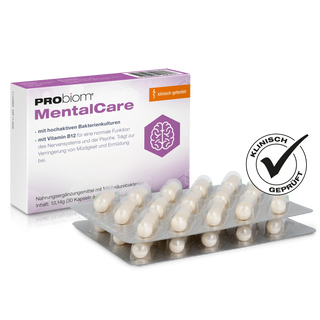Diarrhea (medically known as diarrhea) is one of the most common symptoms affecting people worldwide. Whether acute or chronic, the possible causes of diarrhea are diverse and range from infections to psychological stress. In this article, we explain what exactly can be behind diarrhea, how strongly psychological factors influence it, and why probiotics can be an important part of treatment.
What is diarrhea anyway?
Diarrhea is defined as stools that occur more than three times a day and have a liquid or mushy consistency. Diarrhea can be acute (occurring suddenly and usually clearing up within a few days) or chronic (lasting for weeks or months). Chronic diarrhea, in particular, should be taken seriously and medically investigated.
The most common causes of diarrhea
Infections
Acute diarrhea is often caused by viral infections (e.g., norovirus, rotavirus) or bacterial infections (e.g., salmonella, campylobacter). Parasites such as Giardia lamblia can also trigger diarrhea, especially after travel abroad.
Food intolerances
Intolerances to lactose , fructose , or gluten (celiac disease) can irritate the intestines and cause recurrent diarrhea. Additives in processed foods (such as sorbitol) are also common culprits.
Irritable bowel syndrome (IBS)
Irritable bowel syndrome is often accompanied by recurrent diarrhea, sometimes alternating with constipation. The exact cause is unknown, but stress and impaired gut-brain communication appear to play a major role.
Inflammatory bowel diseases
Chronic diseases such as Crohn's disease or ulcerative colitis lead to persistent inflammation in the intestines and often cause severe, bloody diarrhea.
Medications
Antibiotics, laxatives or certain cancer drugs can cause diarrhea as a side effect by disrupting the balance of the intestinal flora.
Hormonal causes
Hormonal disorders, such as hyperthyroidism or adrenal insufficiency , can affect the water balance of the intestine and cause diarrhea.
The role of the psyche in diarrhea
What many underestimate: Psychological factors can play a significant role in diarrhea. The so-called gut brain (enteric nervous system) is closely connected to our brain – scientists refer to this as the gut-brain axis .
This is how the psyche influences the intestines:
-
Stress, anxiety and nervousness can accelerate bowel movements (so-called stress diarrhea).
-
Chronic psychological pressure changes the composition of the intestinal flora and promotes inflammatory reactions.
-
Depression and anxiety disorders are often associated with irritable bowel symptoms such as diarrhea or flatulence.
This explains why many people suddenly suffer from diarrhea before exams, job interviews or stressful phases of life.
In short: The psyche can have a massive impact on the intestines – even leading to recurring or chronic diarrhea.
Probiotics: Gentle helpers for diarrhea
Probiotics are living microorganisms that, when consumed in sufficient quantities, have a positive effect on health. Probiotics can help restore the disturbed balance in the intestines, especially in cases of diarrhea.
Probiotics for infectious diarrhea
In cases of infections (e.g. traveler’s diarrhea or after antibiotics), probiotics help:
-
To displace harmful germs,
-
to strengthen the intestinal barrier,
-
and significantly shorten recovery time.
Particularly proven strains are:
-
Saccharomyces boulardii
-
Lactobacillus rhamnosus GG
-
Lactobacillus reuteri
Probiotics for stress-related diarrhea
Probiotics can also play a key role in treating psychologically induced diarrhea. Certain bacterial strains have a calming effect on the gut-brain axis and can mitigate the body's stress response. Examples include:
-
Bifidobacterium longum
-
Lactobacillus helveticus
Long-term use
Regular intake of high-quality probiotics can help sustainably strengthen the microbiome and improve overall intestinal health – an important basis for preventing bouts of diarrhea.
Conclusion: Understand the causes of diarrhea and treat them holistically
Diarrhea has many different causes – from infections to food intolerances to psychological stress. The importance of the psychological factor is often underestimated, although it plays a central role.
Probiotics offer a natural way to support the gut and positively influence both acute and chronic diarrhea. Strengthening your gut health not only supports your digestive tract but also your overall well-being.
However, if symptoms persist, you should definitely consult a doctor to rule out serious underlying diseases.













